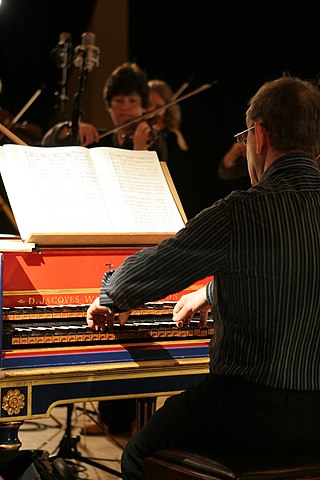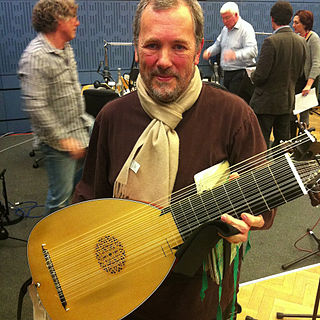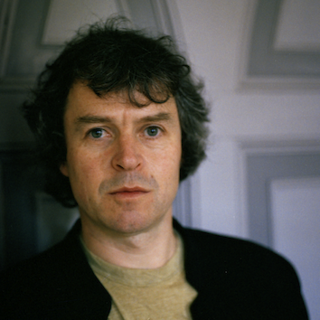
Trevor David Pinnock is a British harpsichordist and conductor.

The Taverner Choir, Consort and Players is a British music ensemble which specialises in the performance of Early and Baroque music. The ensemble is made up of a Baroque orchestra, a vocal consort and a Choir. Performers place emphasis on a historically informed performance practice and players work with restored or replicated period instruments.
The English Concert is a baroque orchestra playing on period instruments based in London. Founded in 1972 and directed from the harpsichord by Trevor Pinnock for 30 years, it is now directed by harpsichordist Harry Bicket. Nadja Zwiener has been orchestra leader (concertmaster) since September 2007.

A harpsichordist is a person who plays the harpsichord. Harpsichordists may play as soloists, as accompanists, as chamber musicians, or as members of an orchestra, or some combination of these roles. Solo harpsichordists may play unaccompanied sonatas for harpsichord or concertos accompanied by orchestra. Accompanist harpsichordists might accompany singers or instrumentalists, either playing works written for a voice and harpsichord or an orchestral reduction of the orchestra parts. Chamber musician harpsichordists could play in small groups of instrumentalists, such as a quartet or quintet. Baroque-style orchestras and opera pit orchestras typically have a harpsichordist to play the chords in the basso continuo part.
An early music revival is a renewed interest in music from ancient history or prehistory. The general discussion of how to perform music from ancient or earlier times did not become an important subject of interest until the 19th century, when Europeans began looking to ancient culture generally, and musicians began to discover the musical riches from earlier centuries. The idea of performing early music more "authentically", with a sense of incorporating historically accurate performance practice, was more completely established in the 20th century, creating a modern early music revival that continues today.
Simon Andrew Thomas Standage is an English violinist and conductor best known for playing and conducting music of the baroque and classical eras on original instruments.
Lisa Beznosiuk is an English flautist of Ukrainian and Irish descent, specializing in period performance of baroque and classical music on historical flutes.
Anthony Pleeth, born in 1948 in London, is an English cellist, specialising in the historically informed performance of music of the 18th and 19th centuries on period instruments.
Robin Blaze is a British countertenor.
Rachel Podger FLSW is a British violinist and conductor specialising in the performance of Baroque music.
Paul Goodwin is an English conductor and former oboist.
Millicent Irene Silver was an English harpsichordist, who began her career as a pianist and violinist.

Nigel North is an English lutenist, musicologist, and pedagogue.

The Sonata in E major for flute and basso continuo is a sonata for transverse flute and figured bass composed by J. S. Bach in the 1740s. It was written as the result of a visit in 1741 to the court of Frederick the Great in Potsdam, where Bach's son Carl Philipp Emanuel had been appointed principal harpsichordist to the king the previous year. It was dedicated to Michael Gabriel Fredersdorf, the king's valet and private secretary, who, like the king, was an amateur flautist.
Boston Baroque is the oldest period instrument orchestra in North America. It was founded in 1973 by the American harpsichordist and conductor, Martin Pearlman, to present concerts of the Baroque and Classical repertoire on period instruments, drawing on the insights of the historical performance movement.
David Reichenberg was an American oboist and a highly respected specialist on the baroque oboe. He was born in Cedar Falls, Iowa and learnt the flute, violin, and piano as a child. He began his oboe studies with Dr. Myron E. Russell of the University of Northern Iowa. Beginning in 1969, Reichenberg studied at the Indiana University School of Music, continuing his oboe studies with Jerry Sirucek, former oboist with the Chicago Symphony Orchestra. Graduating in 1972, Reichenberg moved to Salzburg, where he attended the Mozarteum. It was in Salzburg that Reichenberg met Nikolaus Harnoncourt, director of Concentus Musicus Wien. Reichenberg became increasingly interested in playing the oboe's repertoire on the instrument for which it had been written and, with the assistance of Harnoncourt, moved to Vienna in order to study baroque oboe with Jürg Schäftlein. He simultaneously studied oboe making with Paul Hailperin, building the instrument upon which he played for four years. Reichenberg took part in many concerts and recordings with Concentus Musicus, and gradually increased his activities with that group.

Richard John Campbell was an English classical musician, best known as a founder member of the early music ensemble Fretwork and for his newer association with the Feinstein Ensemble, specialising in historically accurate performance of 18th-century music.
Rogers Henry Lewis Covey-Crump is an English tenor noted for his performances in both early music and contemporary classical music. He has sometimes been identified as an haute-contre tenor. He has performed for over 50 years in choirs and ensembles such as the Hilliard Ensemble, and as a soloist. He has been especially in demand for the part of the Evangelist in Bach's St Matthew Passion and St John Passion. He also specialises in vocal tuning, and has written articles on the subject.

Julian Perkins is a British conductor and keyboard player. Shortlisted for the Gramophone Award in 2021, he is Artistic Director of the Portland Baroque Orchestra in the USA. He lives in London, England and is also Founder Director of the early music ensemble Sounds Baroque and Artistic Director of Cambridge Handel Opera Company.
Rachel Brown is a British flautist and author, known especially for her work with Baroque music and flutes. She is currently professor of baroque flute at the Royal College of Music in London, in addition to traveling around the world to give masterclasses. She has performed with many orchestras internationally, including as principal flute with Kent Opera, the Academy of Ancient Music, the Hanover Band, the King's Consort, Collegium Musicum 90, Ex Cathedra, and the Brandenburg Consort. She is known for her extensive work and mastery of both historical and modern flutes.






